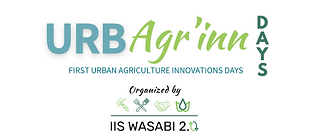
.png)
SUSTAINABLE PROFITABILITY
(organized by J-E Jansma)
Although (peri-) urban agriculture (UA) has co-existed with urban life ever since the expansion of early human settlements, current UA is considered a new branch of activities strongly linked to the present urban interest in the provenance of food. Moreover, the recent urban interest in agriculture in (peri-)urban areas corresponds to the expectation that it can counterbalance the pressure on liveability and sustainability in an era of urbanisation. A growing body of evidence suggests that UA fulfils a multitude of valuable functions in the dense urban zones. Hence, UA is valued not only for its food production at local scale but also for the variety of economic, social, health and ecological benefits it provides. Moreover, food production in urban areas itself is being re-evaluated in the light of geopolitical tensions.
Today, UA encompasses a high variety of practices which are continuously evolving. However, the rise of UA concomitantly evokes the question if a certain level of regional food supply is sustainable, economically viable or feasible and socially acceptable given the limited availability of land in and around cities, the limited and sub-optimal production conditions in urban areas, the lack of supportive infrastructures, the fact that peri-urban agriculture has to compete with better equipped food-producing rural areas and the competition with other functions which demand space in urban areas.
Especially in this complex situation, one cannot take a position based on priory assumptions what is efficient and what not, and what is economically viable and socially acceptable and what not. We have the responsibility to appraise if and how UA contributes to social-economic viability in the setting of rampant urbanisation. This responsibility should be borne collaboratively by businesses, policies, research, and civil society, emphasising the importance of collaboration in addressing the contribution and trade-off’s of modern urban agriculture!
Session overview
During this workshop, we will dive deeper into the economic and social contribution of urban agriculture. Firstly, we will set the scene by providing a broad outline of urban agriculture. What are we talking about when we talk about urban agriculture? A sharp definition and typology will bring the playing field into focus. Next, three speakers will highlight the socio-economic contribution (and possible trade-off’s) of urban agriculture, based on their experiences with tangible examples in The Netherlands.
Session outline
The session will start with four key notes, that shed light on the different aspects of the profitability of urban agriculture.
Key note (1): Introduction in typology of urban agriculture: new innovations in urban agriculture beyond community gardens
Key note (2): Innovation in urban farming systems with different levels of citizen contribution: reflection at concepts like CSA farms and citizen led farms (Heren Boeren)
Key note (3): Innovation in retail driven short supply chains that support development of urban agriculture: how can short supply chains of urban agriculture effectively contribute to local food?
Key note (4): Indirect values and social innovations as contributors to socially acceptable urban agriculture.
Subsequently, The second part of the session is a round table discussion with the keynote speakers. We will break into two groups. The first group will discuss the economic perspectives of urban agriculture, while the other group will discuss the indirect, social, value of urban agriculture. Halfway through, the groups will switch so that each can contribute to both facets.
